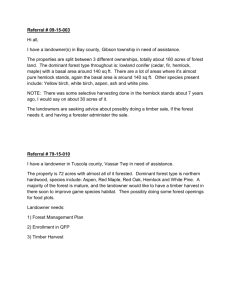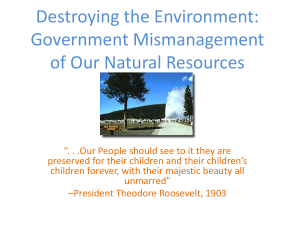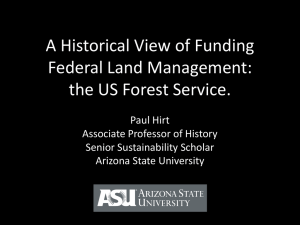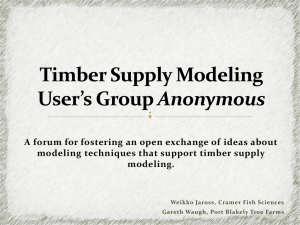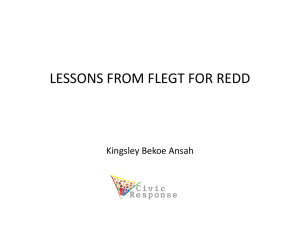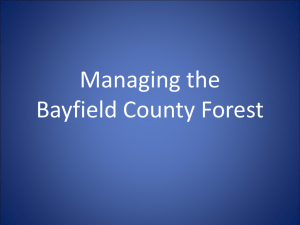ADDENDUM TO BUSINESS CASE FOR SPENDING PERIOD 2015
advertisement
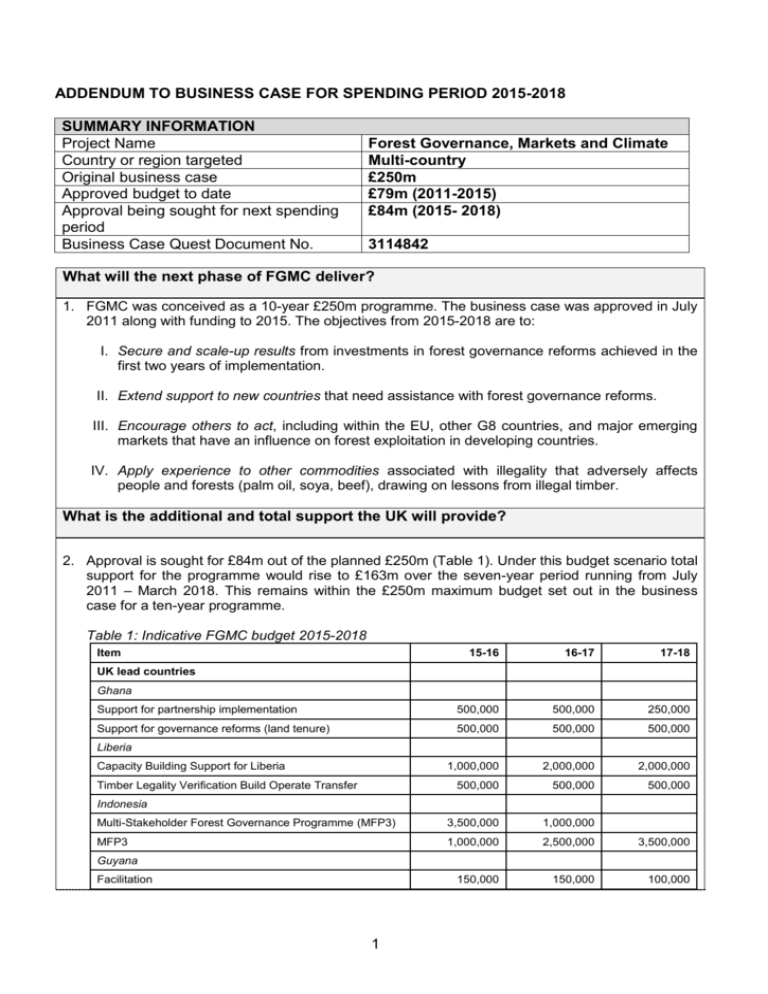
ADDENDUM TO BUSINESS CASE FOR SPENDING PERIOD 2015-2018 SUMMARY INFORMATION Project Name Country or region targeted Original business case Approved budget to date Approval being sought for next spending period Business Case Quest Document No. Forest Governance, Markets and Climate Multi-country £250m £79m (2011-2015) £84m (2015- 2018) 3114842 What will the next phase of FGMC deliver? 1. FGMC was conceived as a 10-year £250m programme. The business case was approved in July 2011 along with funding to 2015. The objectives from 2015-2018 are to: I. Secure and scale-up results from investments in forest governance reforms achieved in the first two years of implementation. II. Extend support to new countries that need assistance with forest governance reforms. III. Encourage others to act, including within the EU, other G8 countries, and major emerging markets that have an influence on forest exploitation in developing countries. IV. Apply experience to other commodities associated with illegality that adversely affects people and forests (palm oil, soya, beef), drawing on lessons from illegal timber. What is the additional and total support the UK will provide? 2. Approval is sought for £84m out of the planned £250m (Table 1). Under this budget scenario total support for the programme would rise to £163m over the seven-year period running from July 2011 – March 2018. This remains within the £250m maximum budget set out in the business case for a ten-year programme. Table 1: Indicative FGMC budget 2015-2018 Item 15-16 16-17 17-18 Support for partnership implementation 500,000 500,000 250,000 Support for governance reforms (land tenure) 500,000 500,000 500,000 1,000,000 2,000,000 2,000,000 500,000 500,000 500,000 Multi-Stakeholder Forest Governance Programme (MFP3) 3,500,000 1,000,000 MFP3 1,000,000 2,500,000 3,500,000 150,000 150,000 100,000 UK lead countries Ghana Liberia Capacity Building Support for Liberia Timber Legality Verification Build Operate Transfer Indonesia Guyana Facilitation 1 Implementation support 1,000,000 New country I Facilitation and negotiation support 1,500,000 1,500,000 1,500,000 500,000 1,500,000 1,500,000 Facilitation in West & Central Africa 1,366,328 1,391,872 1,000,000 Implementation in Republic of Congo 1,500,000 1,000,000 500,000 2,000,000 2,000,000 2,000,000 680,000 600,000 400,000 12,000,000 12,000,000 10,000,000 Management agent 850,000 850,000 850,000 Staff contracts 400,000 400,000 400,000 Monitoring & evaluation 975,000 600,000 600,000 29,921,328 28,991,872 25,200,000 New country II Facilitation and negotiation support UK non-lead countries Core support to the FLEGT Action Plan EU FLEGT Facility Collaboration with emerging consumer countries China investment footprint Accountable grants Grant portfolio (total) * Programme management Total * Phase I grant portfolio is presented in Annex I. This will be rejuvenated in light of changing programme priorities. 3. Sustainability of the intervention (and lasting impact from UK funding) will be guaranteed by the alignment of regulation, trade and private sector interests with programme objectives, and by establishing partnerships with countries that are based on economic interests, rather than an aidfocused relationship. 4. Encouraging action by other donors also contributes to sustainability. Collective EU investments to date (including those made by the UK) have amounted to €600m since the inception of the FLEGT Action Plan, and further major commitments by the European Commission, Germany and others are being lined up for the cost extension period. 5. However, success in drawing others to support this work does not mean that UK funding should cease. DFID has driven this policy agenda from its inception and the continued support will be required to sustain this momentum. Continued UK funding is also required to safeguard UK interests in the broader programme of work, including a focus on poverty and gender. What are the expected results? 6. The programme is having a transformational impact, working at a national scale across 15 countries1 to secure institutional and policy reforms, with far-reaching consequences for transparency, accountability, land tenure, human rights, governance and economic development. Expected results will be achieved through sustaining and scaling up the investments set up in the first two years of the programme (Box 1). Cameroon, Central Africa Republic, Ghana, Indonesia, Liberia, Republic of Congo, Côte d’Ivoire, Democratic Republic of Congo, Gabon, Guyana, Honduras Laos, Malaysia, Thailand, Vietnam. (Bold denotes UK lead). 1 2 7. Prospects are good. A larger than expected number of countries is negotiating partnership agreements. There are good prospects for both Indonesia and Ghana to pass through major milestones in 2014, showing the way forward for other countries. An EU Timber Regulation which prohibits imports of illegal timber is now in place, reinforcing existing demand-side measures. 8. Transformational shifts in policy towards indigenous rights for women and men have been recorded in Indonesia and Congo. The opportunities presented by these shifts in policy now need to be pressed home. 9. FGMC is also helping to bring about a shift in the “rules of the game” for the timber trade in Europe and further afield, through ensuring effective implementation of the EU Timber Regulation, and is also supporting a reflection and debate about the “rules of the game” in relation to other commodities associated with deforestation, including palm oil, soya and beef. Box 1: Results highlights Facilitating international trade in timber from legally-verified sources: Ghana has moved close to readiness for licenced timber exports and may become the first country to pass through this important milestone during of 2014. Indonesia is also closing in on this major milestone. Supporting national action to tackle corruption: The President of Liberia acted to halt the illegal issuance of timber extraction permits following an investigation by civil society groups, preventing significant loss of state revenues and damage to forest livelihoods. Indonesia’s Corruption Eradication Commission (KPK) successfully prosecuted a policeman for involvement in illegal logging and money laundering. The prosecution followed an investigation by the Independent Forest Monitoring Network (JPIK). Helping small and medium timber enterprises to grow: Market access for timber products worth US$10bn annually has been safeguarded by programme investments in a legality assurance system, and support is being provided to help small and medium-sized enterprises take advantage of this commercial opportunity. Building local civil society capacity: UK civil society organisations are helping local non-state actors to make an effective contribution to forest governance reforms, and draw attention to infractions of the law. The impact of this work can be seen through the effective interventions made by NGO watchdogs in Indonesia and Liberia (above). Creating momentum for policy reform: Chatham House has informed a debate in the UK and across the EU on the role of trade and procurement policies in curbing deforestation associated with agricultural commodities, laying the foundations for further work on this important issue. Putting our own house in order through closing our market to illegal timber: Effective implementation of the EU Timber Regulation, facilitated by programme interventions to train and foster collaboration between EU competent authorities, is changing the rules of the game and transforming practices across all EU industries which import timber. The EU market is now off limits to those who seek to profit from forest crimes that harm economies and local people in countries where DFID works. Driving change in the private sector: The introduction of the EU Timber Regulation has changed the rules of the game for the timber industry. Affected companies are being engaged constructively and effectively to help them respond to these changes, through a programme of awareness raising and capacity building implemented through the European Timber Trade Federation (ETTF) and its member companies. Speeding up the back-markers: Research and advocacy has helped to maintain pressure for reform in stakeholder groups that have been slow to respond to the transformation that is taking place. For example, the Bankwatch video produced by Global Witness has encouraged major financial institutions to examine their lending practices to the timber industry. 10. Building on these foundations, the next spending period will deliver further results against the golden thread themes of transparency, accountability, land tenure reform; support sustainable economic growth through trade in legally verified timber; and support girls and women (Box 2). 11. In Ghana, the programme will realise reforms to land tenure that have arisen from partnership implementation. In Liberia, the programme will rebuild the capacity of the Forestry Development Authority to manage Liberia’s forests in the interests of forest-dependent communities and 3 sustainable economic growth, and address illegality associated with land acquisition. 12. In Indonesia the programme will ensure small and medium-sized enterprises comply with legality assurance requirements, and support communities assert claims to forest land following a ground-breaking 2013 Constitutional Court ruling. In Guyana the programme will broker a partnership agreement based on meaningful dialogue between Guyanese government and civil society, and support implementation of this agreement. Box 2: Results for girls and women Girls and women in forest-dependent communities are frequently excluded from property rights, rarely own the land they cultivate, or have secure access to forest resources upon which they depend. Discrimination, lack of rights and security, and limited opportunities lock women into a cycle of vulnerability and poverty. The programme works to break this cycle at different levels, providing grant support through human rights and environmental NGOs focused on securing gender justice through reform of laws relating to land tenure and use of forest resources. Actions supported include: Support to build the capacity of civil society actors and forest communities to play an active role in the negotiation and implementation of partnership agreements, and reflect the specific needs of women through their advocacy; Research to better understand the human rights implications of customary law for women; and dialogue and advocacy to address gender discrimination and equity in customary law, and to ensure that the rights of women are respected. Use of legal channels to address violations of the rights of women and girls, through compiling evidence of rights violation, particularly in relation to ownership of land, access to forest resources and economic empowerment, and submission of this evidence to legal processes at the national and international levels. Systematic and direct participation by women’s representatives as well as men in all policy and legal advocacy work supported by international organisations advocating the rights of forest-dependent people. Improved workplace conditions through better enforcement of labour laws in timber processing facilities, where the workforce is often predominantly women . 4 Annex I Overview of work currently supported Assistance is provided through service contracts with companies, MoUs with governments and international organisations; and accountable grants to non-profit organisations. Service contracts Project Title Partner Support Unit for Liberia FLEGT Voluntary Partnership Agreement (VPA) Implementation HTSPE Ltd Establishment and Operation of a Timber Legality Verification Department, Liberia SGS S.A. Project Management Office to Support Coordination of China-UK Cooperation on Forest Governance, Markets and Climate Multi-Stakeholder Forest Governance Programme, Indonesia Facilitation Unit for Forest Law Enforcement, Governance and Trade (FLEGT) Voluntary Partnership Agreements in Africa Monitor Implementation of the Forest, Governance, Markets and Climate (FGMC) Programme Guyana Facilitation and Negotiation Support LTS International Ltd TBA Coffey International Development Ltd ITAD Ltd. TBA MoUs Project Title Partner Ghana Direct Support Ghana Forestry Commission EU FLEGT-REDD Facility European Forest Institute (EFI) Review of Intergovernmental Arrangements on Forests and their Effectiveness United Nations Forum on Forests Support for FLEGT VPA Republic of Congo Agence Français de Développement FAO FLEGT Grants Programme Food and Agriculture Organisation Accountable grants Project Title Partner Engaging the Timber Trade in Tackling International Forestry Initiatives European Timber Trade Federation (ETTF) Civil Society Engagement in Governance Reforms in African High Forest Well Grounded Progress with Improving Forest Governance and Tackling Illegal Logging Chatham House Promoting Good Governance in the Forest Sector FERN Forest Footprint Disclosure Global Canopy Strengthening Forest Governance Through Civil Society Tracking of Illicit Timber Flows Sustainable and Accountable Forest Management (SAFM) Environmental Investigation Agency (EIA) Global Witness Supporting Forestry Communities to Improve their Tenure and Market Access Rights and Resources Initiative (RRI) Capacity Strengthening and Empowerment to Improve Forest Governance Centre for International Development and Training (CIDT) Transforming Global Markets for Timber and Agriculture Forest Trends Strengthening Local Governance Systems to Improve Business Climate in Mesoamerica Forest Sector International Union for the Conservation of Nature (IUCN) Client Earth FGMC Support Client Earth Promoting poverty alleviation, and improving land tenure security and governance in the Congo Basin through community based mapping, legal capacity building and documentation of customary tenure and governance Rainforest Foundation-UK Africa Natural Resources Capacity Building Partnership The ProForest Initiative Global Forest Watch 2.0 World Resources Institute Community-based forest monitoring in support of community livelihoods, forest sector reforms and effective implementation of legal and voluntary standards Forest People’s Programme 5 Accountable grants by primary theme Private sector engagement in responsible practice Policy analysis Advocacy and transparency Demand-side measures Civil society capacity building Community empowerment and tenure reform Service contracts will be continued, subject to effective performance and a continued need for DFID support. Support through MoUs with Ghana, EFI and AFD will continue, subject to effective performance and continued need. No further support to UNFF is planned at this stage. Accountable grants will continue to be used to support programme delivery, however, the current portfolio of grants may be adjusted to reflect changing needs and emphasis within the programme. 6
